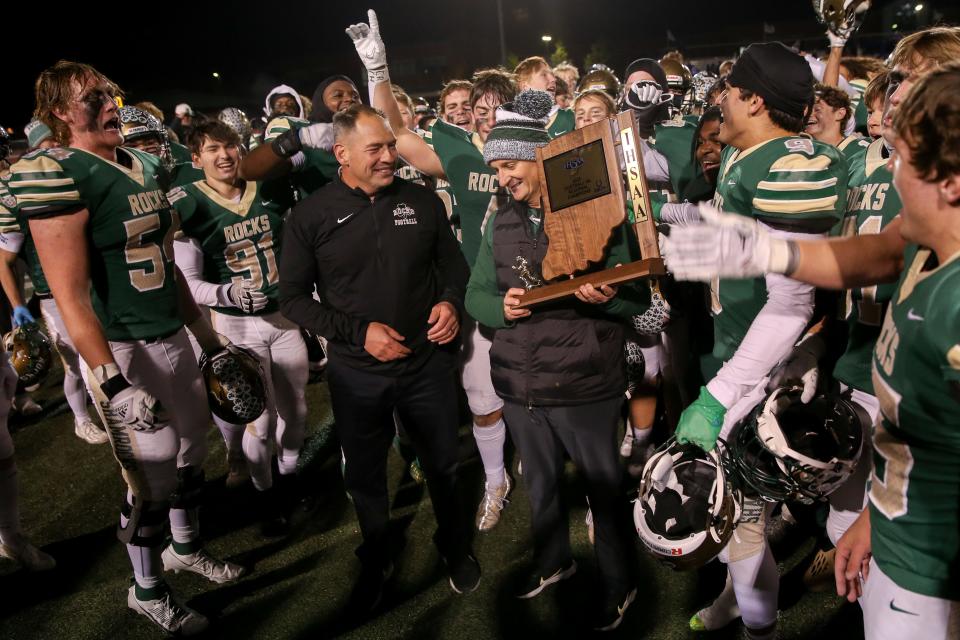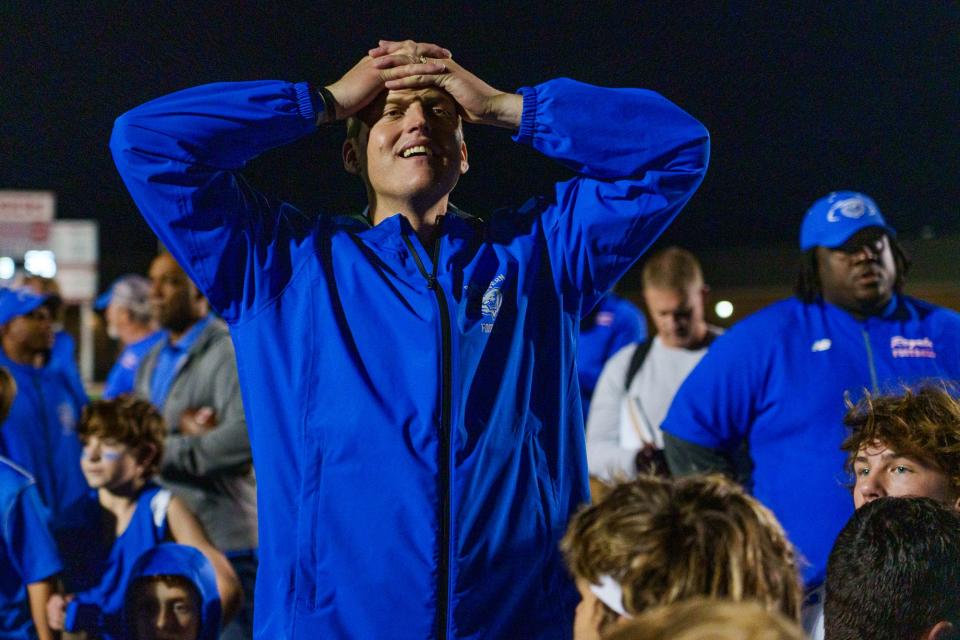Indiana only state that doesn't seed football tournament. Why blind faith in blind draw?
I wish Michael Kelly the best of luck.
The Indiana High School Athletic Association clearly has no interest in seeding the high school football tournament, a reality that hit me six years ago when proposal from the Indiana Football Coaches Association was shelved before it could even really get off the ground after some nudging from the IHSAA.
I gave up on the idea it would ever happen, going about with my life. Fine. The football season is great, could be made better with a little elbow grease, but hey, I’m not going to write about the potential for seeding the tournament every week when I know it’s not going to happen.
No seeding: Proposal from IFCA to seed 6A will not make it to IHSAA board
Then I heard there was potential again for seeding, this time coming from the Class 6A coaches. The idea, with 80% of the 6A coaches in support, was to seed the north and south from No. 1 through 16 by the Sagarin Ratings. A two-year pilot program was the idea, just to see how seeing the tournament might look. I got my hopes up.
Again, it never got off the ground. The IFCA was more than 70% in support of moving forward with a proposal, according to IFCA executive director Bob Gaddis, but there were concerns (including travel, seeding by Sagarin) in conversation with the IFCA membership, Indiana Interscholastic Athletic Administrators Association and IHSAA that led to an altered proposal. That proposal, which called for the seeding at the regional level with two eight-team quadrants in the north and two in the south with the top four teams seeded and the other four selected by a blind draw, fell flat (79% of the IIAAA board voted against).
“We felt we had a solid, professional, well thought out proposal and had a good discussion with their board,” Gaddis said. “We received good feedback from the IIAAA and IHSAA, but we did not receive the needed support to officially present to the IHSAA.”
I was not surprised. Even though 49 other states have some sort of seeding for its football tournament, we seem to be forever mired in Ping Pong Ball, USA.

“There’s a reason we’re the only state that does it this way,” said former Westfield coach Jake Gilbert, now the defensive coordinator/coach-in-waiting at Wabash College. “And it’s not because we’re smarter than everyone else.”
Gilbert was directly involved with the seeding proposal six years ago and again this time around. Life goes on. There are certainly worse problems. But I am hopeful Kelly, the Hamilton Southeastern coach, and some of his fellow coaches are fired up on this topic.
“It’s disappointing that the IIAAA and the IHSAA aren’t interested in working with the coaches in moving the tournament forward,” Kelly said. “To think we can’t make any adjustments in 40 years of the tournament is baffling, to say the least.”
One of the points raised by former IHSAA commissioner Bobby Cox and current IHSAA commissioner Paul Neidig on seeding: The blind draw gives teams with poor records a chance to play somebody they could possibly beat in the first round. Neidig recently used the example of Knightstown in 2022. That team was 1-8 in the regular season, won two games in the sectional and reached the sectional championship game.
I don’t argue that’s great for Knightstown and certainly a positive for teams that have no real chance of beating a No. 1 seed barring a massive upset. But as Gilbert points out, why does that team matter more than the team that is state-ranked and has to play another state-ranked team in the first round? Gilbert used the example of No. 3 Ben Davis and No. 1 Brownsburg playing in the first round of the 6A sectional last season (a game Ben Davis won with a furious fourth-quarter comeback on the way to a state championship). Kelly used the example of Peru, after a 9-0 regular season, drawing 7-2 Guerin Catholic in the first round of the 3A sectional.
“The gift to (the 1-8 team) is that they get in the tournament,” Gilbert said. “In a lot of other states, they don’t get in at all. Why are those kids more important than the kid on the Brownsburg team that has to play the one team better than them in the state in the first round? How is that fair to them? What if the NFL ran its playoffs that way? When you say, ‘Well, the right team still made the state finals,’ I’m not disagreeing but that’s a slap in the face to the kids who had their season cut short because they had to play the No. 1 team because of a blind draw in the first round. When you are in it, extending the season one more week matters a ton. Why do we think it’s important in one example (the team with a losing record) and not another? You telling me, with the magic Brownsburg had this season, that they wouldn’t have loved another week together? Why does it matter for Knightstown’s kids and not theirs?”
That’s a long quote, but I wanted to use it all because I think Gilbert explains it better than I can, and he’s been invested in this world personally as a high school coach for a long time. I have always wondered, too, why the explanation for the blind draw caters to the 1-8 team and not the 8-1 team.
Gilbert and former Ben Davis coach Jason Simmons, now an assistant at Miami of Ohio, headed the proposal for seeding several years ago. That idea was to combine two four-team sectional groups into eight teams and seed the top two by Sagarin Ratings. The rest would be determined by blind draw. In Class 4A and below, the top two teams were to be seeded by Sagarin with the rest determined by blind draw. The IFCA wanted one pilot year for Class 6A and 2A in 2018 to collect data.
“We had 70% of coaches and administrators on board,” Gilbert said. “What killed it is it dragged on so long, coaches and administrators changed. It started to become about all these other factors, like neutral sites. We lost momentum. The simplicity of seeding on some level had enough support, it was ‘What tool to you use for seeding?’ and ‘Does the lower seed automatically host?’ and those details that people got caught up on. When it was simpler and more about common sense, we had more support.”
The current format, with every team making the tournament, has been in place since 1985. When the football tournament began in 1973, that was not the case. The playoff system continued to expand, then went to a cluster system in 1983 and ’84, which had some proponents but not nearly enough. When the playoffs started, teams were allowed entry through a points system (it expanded from 12 teams in three classes to 24 teams in 1975 to 48 teams in 1980). The IHSAA went to the cluster system in 1983 and ’84 and added a fourth class with 64 teams reaching the playoffs based on their record against their three cluster opponents.
Ron Lemasters, the longtime sports editor of the Muncie Star, wrote this in 1985, the first year of the all-in tournament:
“There is a strong sentiment for a seeding of the top teams in each of the five classes. In Class AAA Saturday night, No. 1 Roncalli plays No. 3 Cathedral in Indianapolis. It’s a meeting both schools would like to see somewhere farther down the tourney trail, and it’s not beyond the realm of possibility that someone will challenge such pairings in court.”
So yeah, even when “Back to the Future” was still raking in cash at the box office, there was talk about seeding. The time seemed right, almost 40 years later, to try something different, especially with more than 80% of 6A coaches in favor.

Kelly, who helped get the proposal off the ground for the IFCA, said he is disappointed “with the integrity of the process.” The IFCA had 70% of coaches in support of a further discussion on seeding the entire tournament and 70% in favor of a two-year pilot program for seeding Class 6A by February. But after the IFCA coaches clinic two weeks ago in Indianapolis, where coaches drove from all over the state to meet, the IFCA was told travel would be an issue under a 1 through 16 format for the north and south. The IFCA basically had a week to restructure its proposal before it went to the IIAAA and was dismissed on Thursday.
“We did a bunch of work and everything changed at the 11th hour,” Kelly said. “It would have been nice to know three months ago it wasn’t going to be considered.”
Now what? This reporter here is tired of beating his head against the wall for something I think could really benefit the football tournament but appears to have little chance of ever happening. Maybe it is instructive to remember that for many years, the decision-makers found reasons not to have a football tournament at all (the weather, delaying basketball season, etc.).
It will be another two years before another proposal could come to a vote.
“I’m not a quitter,” Kelly said. “I’m extremely frustrated but I think we need more answers. Trust is important and I’m not sure there is a lot of that with the IIAAA or the IHSAA right now.”
Call Star reporter Kyle Neddenriep at (317) 444-6649.
This article originally appeared on Indianapolis Star: Indiana high school football coaches don't get wish on tournament seeding

